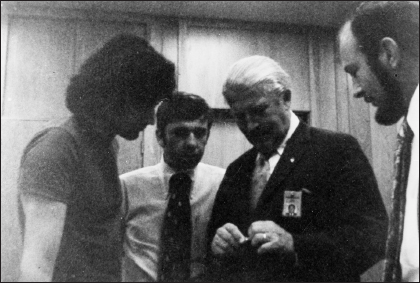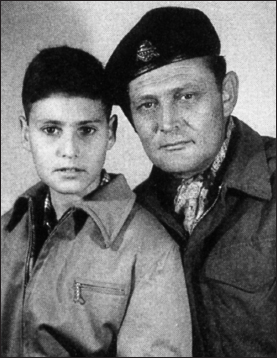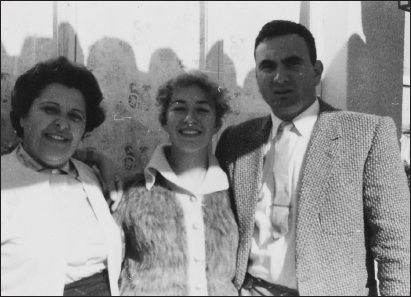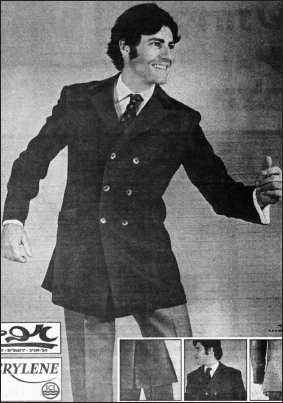The Secret Life of Uri Geller (8 page)
Read The Secret Life of Uri Geller Online
Authors: Jonathan Margolis
Tags: #The Secret Life of Uri Geller: Cia Masterspy?

Uri with Edgar Mitchell (
far right
) and Wernher von Braun at NASA’s Goddard Space Flight Center, after bending von Braun’s wedding ring in the palm of the scientist’s hand. Picture taken with German Minox spy camera by Shipi.
All in all, he felt – and indeed knew – that his abilities were accepted beyond serious question by the US government, right to the top. Yet although Uri’s period as an experimental subject was drawing to an end, his life as an American spy was just about to begin.
A SUBJECT OF INTEREST
T
he path which led Uri Geller from playground prodigy in the back streets of Tel Aviv – a story we will recount later – to young man groomed as the public face of a US government programme designed, essentially, to create a team of psychic spies working against the ‘evil empire’ of the Soviet bloc, starts in earnest in Cyprus in the late 1950s. Uri and his mother had moved to the island to live with his new stepfather, Ladislas Gero, who ran a modest motel in Nicosia. Gero died a year after the move, leaving Uri’s mother alone again – but in Cyprus, with Uri newly settled in as a boarder at the prestigious Terra Santa Catholic School in the hills outside the city.
Uri, a notably imaginative little boy, had, with the unusual powers he seemed to have acquired, long dreamed of putting his abilities to use as a spy or special agent of some kind. The primacy of intelligence in the espionage sense is close to a founding virtue of the state of Israel and has been key to the country’s survival against the odds in modern times. One of the most common symbols seen in Israel, used on everything from food labels to official literature, shows two men carrying a huge bunch of grapes. It is known to every Israeli schoolchild that these men were two of a group of 12 spies, sent by Moses to check out whether the land of milk and honey promised by God really was as fertile as He had told Moses it would be. The grapes were the evidence they brought back to show it very much was the Promised Land that had been yearned for since Abraham’s day.
In 1959, Uri was a 13-year-old, tearing around Nicosia on his bicycle like many other youngsters. As we will see, he was known to some boys and teachers at Terra Santa to have some very odd abilities, but it seems like any child striving to appear normal and unexceptional, he kept his paranormal powers mostly under wraps. He told no one about what he called a green television screen he could envisage.
His stepfather’s unprepossessing little motel happened to be close to the Israeli consulate, and attracted a few business visitors from Israel. One of them was Yoav Shacham, a tall, well-built man in the grain-buying business. Uri was a sociable lad who missed his father, a career soldier back in Israel, and became friendly with the tough-looking Shacham. He reminded Uri of his father: certainly not his stepfather, who had been a gentle, mild, older man. Uri, who went by the more Greek name of George, now mostly spoke English but enjoyed speaking Hebrew with this interesting man, who knew judo and offered to teach him some moves. But while they were practising, Uri says he got the feeling that Shacham was somehow more than a grain buyer. He saw that Shacham got mail from Arab countries, and moreover, Uri believed he could see on his mental TV screen that his friend was both adept with firearms and working with secret documents in some way. It occurred to the young teenager that Shacham was a spy, something that appealed intensely to his increasingly cinema-fired imagination.
One afternoon, Uri says, that when he had to go into the motel’s loft, he found himself above Shacham’s room, from where he could hear a conversation, one which seem to have clear espionage overtones. Peering through a crack around the ceiling light, Uri saw his friend with someone who looked to be a middle-aged Egyptian, who he gathered from what was being said, appeared to live in Israel. The two were poring over documents, which they were photographing and which Uri could see were in Arabic. The men were speaking quietly about the Egyptian Army, something happening in the Sudan and some business concerning agricultural machinery among other matters.
Uri was thrilled and excited. Yoav must be a real Mossad agent! It was the stuff his dreams were made of come true. ‘I wanted to share the secret of the powers with someone I didn’t know too well,’ he explained years later. When Uri told Shacham what he suspected, the agent, as might be expected, was horrified, and probably more than a little ashamed that he had failed so amateurishly to cover his tracks. He confirmed that Uri was correct, and appealed to his young countryman’s patriotism to keep it to himself. Heaven knows what Shacham thought when the boy to whom he had just been obliged to entrust his deadly important secret told him he was the possessor of inexplicable, magical powers.
Uri asked him to think of numbers, which he guessed correctly each time. He made Shacham’s watch hands move. When Shacham invited him out for a walk, Uri told him as they strolled through the streets that he would do anything to spy for Israel, too. Shacham said that he was far too young, but then truly put his life in Uri’s hands when he went on, ‘But you can help me.’ This was the start of a routine whereby, whenever Shacham was away from Cyprus, Uri would collect his mail at the motel and deliver it on his bike directly to the Israeli consul, a one-armed, red-haired man in his 40s. His loyalty was such that he told none of his friends, not even his mother, what he was doing. But he did make one possible mistake for a spy when he wore on first mission to the consulate an Israeli insignia that his father had won.
The consul zoomed in on it, asking gently whose it was. Uri proudly told him about his father being a sergeant major in the Tank Corps. The consul smoothly extracted every detail from Uri. Later, back in Israel, his father came home to find his apartment had been almost taken apart by intruders, although nothing had been stolen. Yoav and Uri, his unpaid courier, meanwhile became close friends. Uri met Yoav’s fiancée, Tammi, and he promised Uri that when he had finished his military duty at 21, he would gladly help the young man get into the secret service. He was quite specific about what the boy should do when he was eventually conscripted, instructing him to join the Paras, get himself into officer school – ‘And then find me.’

Uri, aged 11, with his father, Tibor.
When the time came, Uri knew he had to shine in his army career before the Mossad would even consider him. He served well and loyally for the most part and became a paratrooper as Yoav had directed. He even saw his friend once in the front of a Jeep – the Mossad man seemed to have returned to his own paratroop unit – and, delighted, said hello to him. Uri, who was later wounded while serving in the Six Day War, eventually got into officer school. But as it turned out, the Israeli Defense Forces and Uri Geller were not quite made for one another. While Uri was on his officer-training course, he read in a newspaper that Yoav Shacham had been killed in action. His desire for a military career took an instant nosedive. That very night while on an exercise he fell asleep on duty and had to kicked awake by an officer. His days on the training course came to an end shortly afterwards.
‘Yoav was the key to the door for my future,’ Uri says. ‘His death sank me into despair, firstly because I loved and cared for him, and then because I knew my career was down the drain. Only he really knew of my powers. Suddenly, officer school didn’t seem so important and I was quickly thrown out. My father, who was devastated, advised me to try again. He had been a sergeant major and was desperate for me to do better than he had and make it to officer rank. But for me, leaving and going back to my unit was a great relief. A big responsibility was lifted, and I felt fine about it.’

Yoav Shacham, the Mossad agent who recruited 16-year-old Uri as an unpaid, bicycle-riding courier in Cyprus. Yoav is with his fiancée Tammi and Uri’s mother.
Yet while he kept his paranormal abilities largely quiet in the military, rumours about his remarkable abilities still got around, especially towards the end of his three-year mandatory service period, at the end of 1968. After being wounded in the Six Day War, he had been given the rather pleasant and easy army job of running around Israel on a Vespa scooter he had brought back from Cyprus, tracking down deserters – something he was, unsurprisingly perhaps, very good at. It was about this time, while still in uniform, that he began showing more colleagues what he could do, and was invited by pals to perform at youth clubs and parties.
After returning to civilian life, broke but happy, with his scooter and with a beautiful young model girlfriend in tow, he became a male model, gracing magazine advertisements in some natty swimwear or smart Terylene jackets. While he was on shoots, he would do impromptu demonstrations of his powers for the photographers and technicians, and he began to be invited – for payment – to perform at ‘arty’ parties. Uri, loving fame more and more, was beginning a determined clamber up Israel’s social ladder. Soon, as word got out about a Six Day War veteran, now a male model, who could perform incomprehensible psychic feats, his audiences began to include lawyers, politicians – and senior military officers. Before long, he was being approached by someone he believed to be a Mossad agent, who invited him to do a show at a military base of some kind.

Uri had a brief career as a male model. He is seen here in a stylish tailored Terylene mod jacket.
He found himself being taken to a place called Midrasha. ‘It’s just out of Tel Aviv, near Herzliya,’ he says, ‘on a hill and it’s top secret. You know … it’s all cameras everywhere and barbed wire. They were all Mossad and Secret Service agents, and generals, and spies, and you name it. And I was taken there to give a big lecture, and I think I blew their minds. I moved the hands of a watch. I did mind reading. I instilled pictures in other people’s minds. I did things that they could grab and twist for their own missions.’
He began, in tandem with his show business work in Israel – which was making him one of the most famous men in the country – to undertake operational missions for the secret service. Aharon Yariv, head of military intelligence, met him in a coffee shop to discuss how he might help. Meir Amit, the head of the Mossad, was a powerful supporter of Geller and believer in his powers. Although he resigned in 1968, he remained close to the organization and continued to advocate deploying Uri on a range of tasks. Uri still refuses to reveal specific jobs he was assigned, but he became known by all the major establishment figures of the time, especially the defence minister and military hero, Moshe Dayan, who specifically asked him if he could ‘do certain things’.